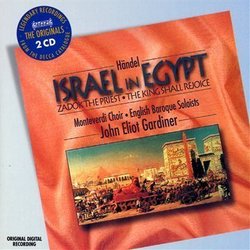| All Artists: Jonathan Peter Kenny, George Frederick Handel, John Eliot Gardiner, English Baroque Soloists, Donna Deam, Elisabeth Priday, Ruth Holton, Andrew Tusa, Nicolas Robertson, Paul Tindall, Philip Salmon Title: Händel: Israel in Egypt; Zadok the Priest; The King Shall Rejoice Members Wishing: 0 Total Copies: 0 Label: Decca Import Release Date: 1/5/2009 Album Type: Import Genre: Classical Style: Opera & Classical Vocal Number of Discs: 2 SwapaCD Credits: 2 UPC: 028947813743 |
Search - Jonathan Peter Kenny, George Frederick Handel, John Eliot Gardiner :: Händel: Israel in Egypt; Zadok the Priest; The King Shall Rejoice
 | Jonathan Peter Kenny, George Frederick Handel, John Eliot Gardiner Händel: Israel in Egypt; Zadok the Priest; The King Shall Rejoice Genre: Classical |
Larger Image |
CD Details |
CD ReviewsA voice teacher and early music fan George Peabody | Planet Earth | 03/07/2009 (5 out of 5 stars) "GARDINER'S 1990 'ISRAEL IN EGYPT'=GREAT MUSIC-MAKING!
It could be said that "Israel in Egypt", composed in 1739, marked a turning-point in Handel's composing life. This was due to the decline of interest in London for Italian Opera, and so began his oratorios. 'Israel in Egypt' is the fifth of the nineteen oratorios, the composition of which for this colossal work took but twenty-seven days! It was performed the first time on April 4th, 1739, at the King's theatre, of which Handel was then the manager. It is essentially a choral oratorio, comprising no less than twenty-eight massive double choruses. Gardiner has chosen to record only Parts two and three on this disc: Part Two 'The Exodus' and Part Three 'Mose's Song'. He has however, recorded separately Part One 'The Ways of Zion Do Mourn' on a 1998 disc that he shares with Nikolaus Harnoncourt who performs 'Utrecht Te Deum' by Handel. (I have reviewed this on Gardiner's website.) Handel gave the Chorus the leading role in this narrative of deliverance; no other oratorio by him gives such a prominent, substantial and varied role to choral movements. The Monteverdi Choir does a superior job of portraying the highly emotional content of this oratorio, and Gardiner guides them skillfully through the numerous vocal effects demanded by the score. Gardiner's choir is so sensitive to the highly dramatic content that it is sometimes wonderfully overwhelming! The one weak element is Ashley Stafford's (alto) account of the frogs (one of God's plagues sent to the Egyptians), which he sings VERY insecurely ending with a hideously rash decoration. Yet Gardiner manages to get across in the otherwise-vapid air the sense of leaping fleas of pestilence and pustule. The tremendous flies and lice chorus overwhelms, as the elements of earth, fire, air and water beset humanity. Most of the other soloists rendered their solos capably and some were very outstanding such as: soprano Ruth Holton, alto Michael Chance, tenor Philip Salmon and bass Christopher Purvis. Unfortunately, Gardiner, in his earlier recordings, has this penchant for dividing the solos and giving them to many different people in his chorus, However, for the listener it can be somewhat annoying ( a small thing, really) at times. Michael Chance's exquisitely rendered solo "Thou Shalt Bring Them In" is memorable in its performance by this skilled countertenor. The Bass duet "The Lord is a Man of War" is sung with much excitement by Julian Clarkson and Christopher Purvis. In the vast and numerous choruses a criterion by which to guage the performance is whether or not the individual parts can be heard. THEY CAN! Moreover,the orchestral parts are clear even in the loudest sections; this is GREAT music-making. The coronation of George II at Westminster Abbey on October 11, 1727, was enhanced greatly by four orchestrally-accompanied anthems contributed by Handel, who had become a British subject seventh months beforehand. Two of these are recorded on this disc: 'Zadok, the Priest' and 'The King Shall Rejoice'. In the Coronation Anthems Handel enjoyed his first opportunity to combine London's ecclesiastical choirs with instrumentalists and possibly some theatre singers. 'Zadok the Priest' treats the description of the annointing of Solomon from the first book of Kings as a cumulative drama starting with the opening orchestral prelude towards the cries of 'God Save the King'. It remains a superior example of Handel's power to make a unique statement with the minimum of technical means. 'The King Shall Rejoice' has a text from Psalm 21 that refers to the crowning ceremony itself: "Thou hast set a crown of pure gold upon his head". THIS 1990 RECORDING IS ANOTHER TESTIMONY TO GARDINER'S ABILITY TO BRING HIS FORCES TOGETHER TO CREATE A GREAT LISTENING EXPERIENCE! The liner notes are 'skimpy', but adequate and in French, German and English. No text is included. " |
